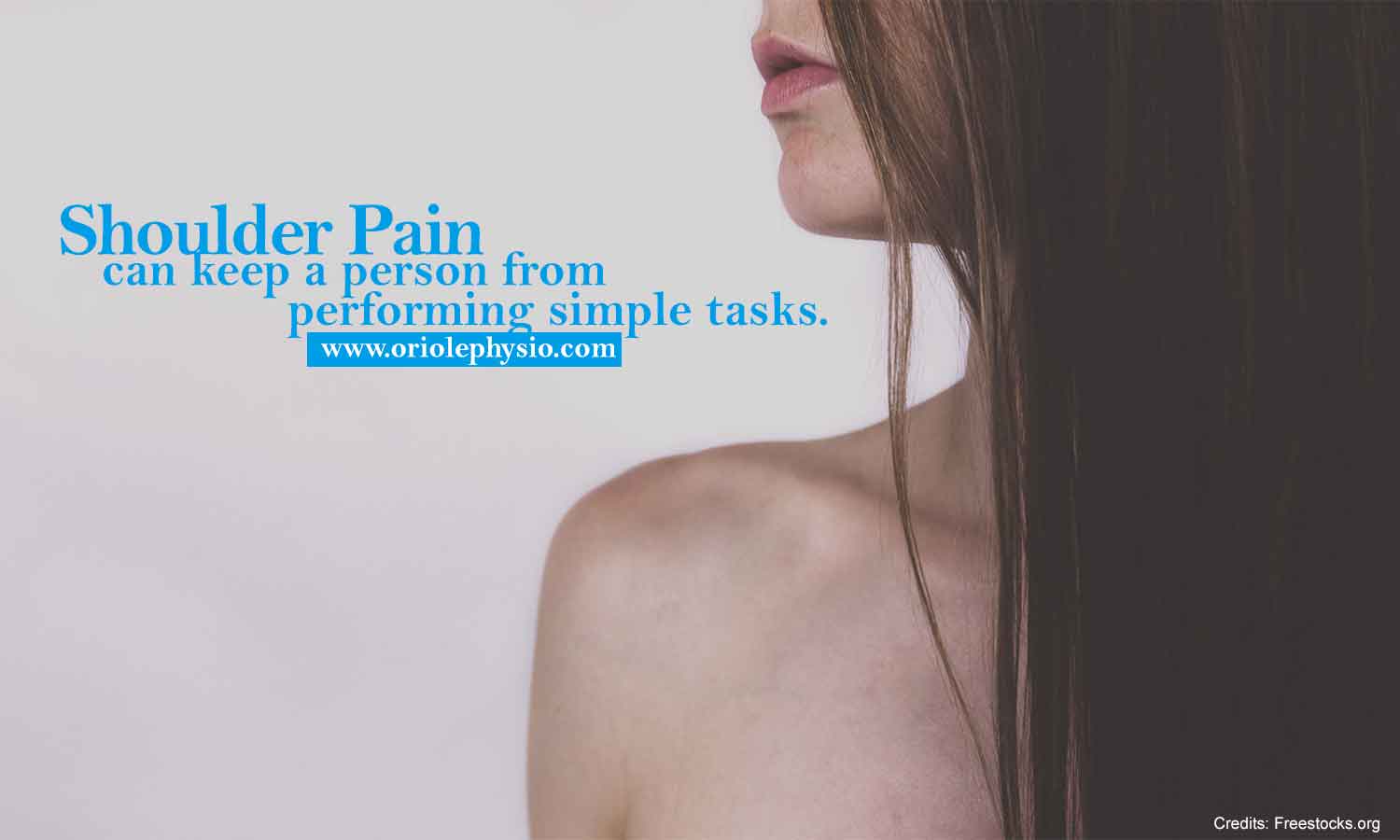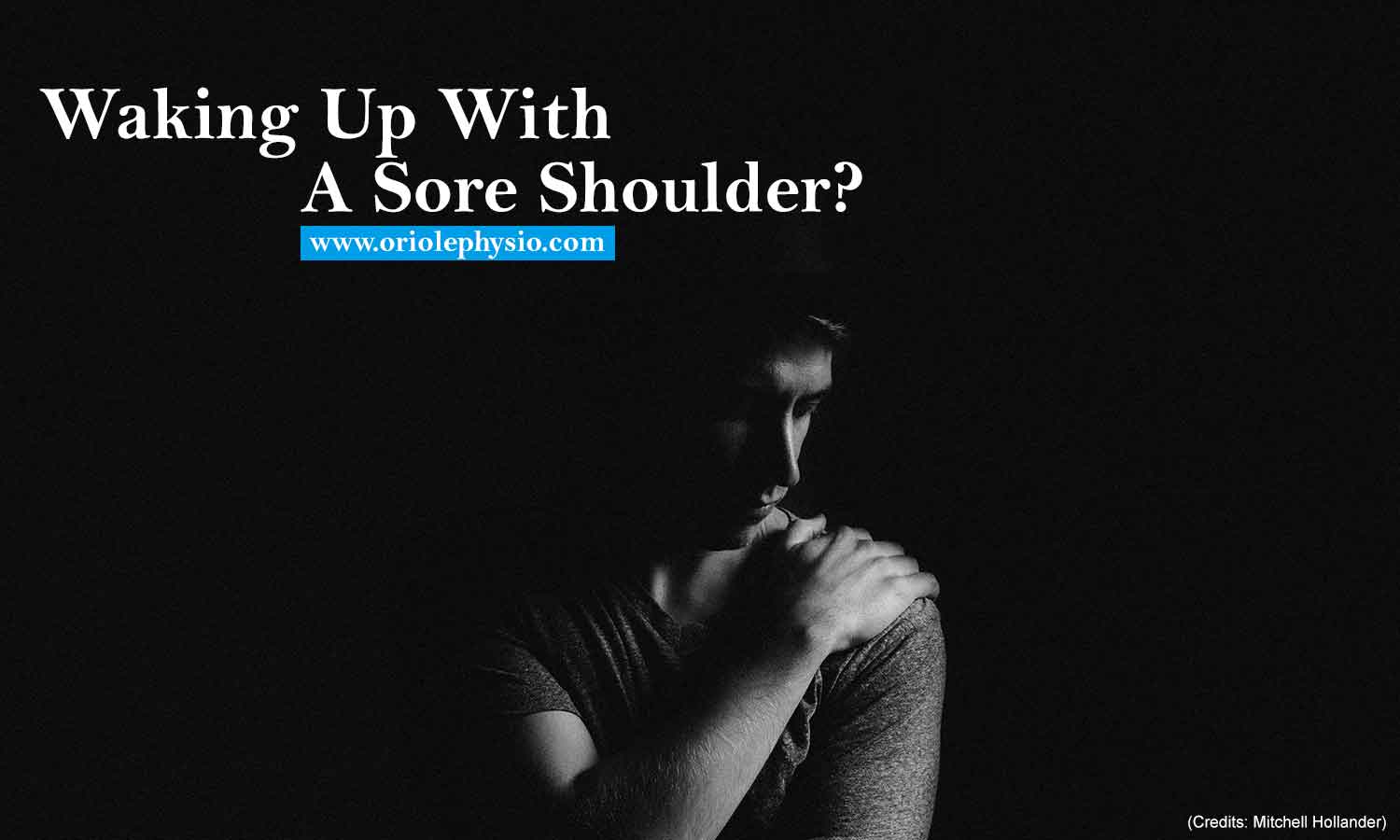Waking Up With A Sore Shoulder?
Do you wake up in the morning to a throbbing shoulder?
Being jolted awake by a sore shoulder is never a great way to greet a new day. If the pain doesn’t go away after a few days, spreads down the arm, or weakens your shoulder or arm area, consider checking in with a physiotherapist near you. To better understand this condition, it’s important to understand the shoulder and explore the potential reasons behind the pain you’re experiencing.

A Quick Review Of Shoulder Anatomy
The shoulder is considered a complex ball-and-socket joint. This is why the stability of the shoulder joint can be compromised relatively easily, compared with other joints. The shoulder is composed of three bone components:
- Clavicle (also known as the collarbone)
- Scapula (alternatively called shoulder blade)
- Humerus (also known as upper arm bone)
The shoulder joint also houses the tendons, ligaments, and muscles. These components are collectively called the ‘rotator cuff’ because they provide stability to the shoulder. They are also called the rotator cuff because they create a ‘cuff’ around the numerus. The muscles found in the shoulder are subscapularis, infraspinatus, and supraspinatus.
The head of the humerus is bigger than its accompanying socket, while the ligaments, tendons, and muscles around it aid in holding the bones of the joint in place. Injuries in this part of the body are often associated with fall incidents, overuse, and degenerative causes.
(If you’re interested in a more detailed explanation of how the shoulder socket works, watch this video.)
Shoulder pain reduces a person’s capacity to perform even the simplest tasks. Shifting positions while in bed also becomes difficult. There are plenty of reasons that can trigger shoulder pain after sleeping. Factors like stress and anxiety may form tension in the muscles surrounding the neck, back, and shoulder region.
Rotator cuff issues, as well as other medical conditions not directly related to the shoulders, can cause shoulder pain. Some of these other causes include:
- Arthritis
- Torn cartilage
- Torn rotator cuff
- Dislocated shoulder
- Inflamed gallbladder (can cause pain in the shoulder blades)
- Bone spurs (bony projections that form along the bone edges)
- Pinched/restricted nerve in the neck or shoulder
- Heart attack
- Pain caused by overuse and excessive use
- Broken shoulder or arm bone
- Spinal cord injury
- Heart attack

Possible Reasons For An Aching Shoulder
Trauma is one of the leading reasons for shoulder pain. There can be many different reasons for shoulder pain; some lifestyle-based, some genetic, and some due to simple wear-and-tear:
Rotator Cuff Tendinosis – A chronic and recurring pain caused by the wear-and-tear of the rotator cuff tendons.
Rotator Cuff Tendinitis (or tendonitis) – The inflammation of the rotator cuff tendons.
Torn Rotator Cuff – An injury that happens when a shoulder muscle or rotator cuff tendons get partially or completely torn. It can result from a shoulder injury.
Shoulder Impingement – When the rotator cuff catches the acromion (muscle attachment point necessary to the shoulder joint), resulting in the reduction of blood flow and the tendons to fray. Symptoms of shoulder impingement include minor yet constant pain in the arm, increasing pain at night, arm/shoulder weakness, and pain that transfer from the shoulder to the arm.
Frozen Shoulder – A severe pain that occurs when the connective tissue surrounding the glenohumeral joint is inflammed. A person with a frozen shoulder cannot perform at his peak due to painful muscle cramping.
Shoulder separation – A type of shoulder injury where the acromion-clavicle (AC) joint separates. A shoulder separation is often caused by physical trauma to the shoulder.
Rheumatoid Arthritis– An autoimmune condition that causes joint pain and inflammation.
Osteoarthritis – The wear-and-tear of the whole joint involving the bone, cartilage, ligaments, and the lining of the joints.
Shoulder Bursitis – When the bursa (space that separates the acromion of the shoulder blade and humerus) is inflamed.
Bone Spurs – Bony growths or outcroppings on your bones. They may require surgery to eliminate slivers of bone in the joint and allow for free movement.

Shoulder Pain Remedies
The treatment you should get should depend on the exact cause of your pain. Sprains and simple strains may require rest and a cold compress for rapid healing. For a fracture or degenerative arthritis, shoulder surgery may be the best recourse. In many cases, physical therapy (also known as physiotherapy) and chiropractic care can be effective in promoting healing and relief from chronic pain.

Proper Sleep Posture
Poor sleep position is also one of the common reasons for an aching shoulder. The spine should be in a neutral position when sleeping; otherwise, you’re putting extra pressure on the neck, shoulder muscles, and cervical spine. For individuals who have sleep apnea, sleeping on their left side is recommended as this prevents the tongue from falling back and blocking airflow. However, this may pinch a nerve and cause pain and tingling in the left shoulder.
Sleeping on your belly doesn’t allow your spine to rest in a neutral position. In effect, the muscles around the spine get stressed out. Side sleeping may release pressure on the shoulder. Sleeping on your back and placing a pillow beneath your knees allows for proper alignment of the spine.
Proper Mattress Support
Sleeping on a poor mattress can also contribute to shoulder pain due to improper alignment of the head, neck, and spine. It’s about achieving balance; a mattress that’s too firm will not contour to the body, while a sagging mattress won’t provide sufficient support for the shoulders and spine.
Memory foam mattresses are a popular choice for people with joint pains. They can provide proper body contouring around the joints and bones, and are sufficiently firm to support the entire body.

Proper Support
Body alignment when sleeping is also an important factor to consider to prevent joint pains. Using too many or excessively stuffed pillows can hurt the back and shoulders. There’s a wide range of pillow materials to choose from, including foam, feather or down, fiberfill, and memory foam. They come in a variety of shapes and sizes as well. Knowing the right material and where you want to use them (beneath your head, as back support, or under your knees) is necessary for achieving the comfort you need to get a full night’s sleep.
If you get a painful shoulder after sleeping even if you have not had an injury, try changing your sleeping position. If the pain persists after a few days or intensifies despite getting proper rest, icing (and taking over-the-counter painkillers), visit a professional physiotherapist to identify the exact cause of pain and effectively reduce the pain you’re experiencing. A physiotherapist can also provide a tailored treatment plan based on your unique condition.
The licensed and experienced therapists at Oriole Physiotherapy and Rehabilitation Centre are committed to lead patients on the path to full recovery from muscle and joint pains. Regain your comfort today and schedule a consultation.
Call us at (416) 221-0772 for more details.

